- Home
- Herman Melville
White Jacket or, The World on a Man-of-War Page 3
White Jacket or, The World on a Man-of-War Read online
Page 3
But with what purpose had he deserted? To avoid naval discipline? To riot in some abandoned sea-port? for love of some worthless signorita? Not at all. He abandoned the frigate from far higher and nobler, nay, glorious motives. Though bowing to naval discipline afloat; yet ashore, he was a stickler for the Rights of Man, and the liberties of the world. He went to draw a partisan blade in the civil commotions of Peru; and befriend, heart and soul, what he deemed the cause of the Right.
At the time, his disappearance excited the utmost astonishment among the officers, who had little suspected him of any such conduct of deserting.
"What? Jack, my great man of the main-top, gone!" cried the captain; "I'll not believe it."
"Jack Chase cut and run!" cried a sentimental middy. "It must have been all for love, then; the signoritas have turned his head."
"Jack Chase not to be found?" cried a growling old sheet-anchor-man, one of your malicious prophets of past events: "I though so; I know'd it; I could have sworn it-just the chap to make sail on the sly. I always s'pected him."
Months passed away, and nothing was heard of Jack; till at last, the frigate came to anchor on the coast, alongside of a Peruvian sloop of war.
Bravely clad in the Peruvian uniform, and with a fine, mixed martial and naval step, a tall, striking figure of a long-bearded officer was descried, promenading the Quarter-deck of the stranger; and superintending the salutes, which are exchanged between national vessels on these occasions.
This fine officer touched his laced hat most courteously to our Captain, who, after returning the compliment, stared at him, rather impolitely, through his spy-glass.
"By Heaven!" he cried at last-"it is he-he can't disguise his walk-that's the beard; I'd know him in Cochin China.-Man the first cutter there! Lieutenant Blink, go on board that sloop of war, and fetch me yon officer."
All hands were aghast-What? when a piping-hot peace was between the United States and Peru, to send an armed body on board a Peruvian sloop of war, and seize one of its officers, in broad daylight? — Monstrous infraction of the Law of Nations! What would Vattel say?
But Captain Claret must be obeyed. So off went the cutter, every man armed to the teeth, the lieutenant-commanding having secret instructions, and the midshipmen attending looking ominously wise, though, in truth, they could not tell what was coming.
Gaining the sloop of war, the lieutenant was received with the customary honours; but by this time the tall, bearded officer had disappeared from the Quarter-deck. The Lieutenant now inquired for the Peruvian Captain; and being shown into the cabin, made known to him, that on board his vessel was a person belonging to the United States Ship Neversink; and his orders were, to have that person delivered up instanter.
The foreign captain curled his mustache in astonishment and indignation; he hinted something about beating to quarters, and chastising this piece of Yankee insolence.
But resting one gloved hand upon the table, and playing with his sword-knot, the Lieutenant, with a bland firmness, repeated his demand. At last, the whole case being so plainly made out, and the person in question being so accurately described, even to a mole on his cheek, there remained nothing but immediate compliance.
So the fine-looking, bearded officer, who had so courteously doffed his chapeau to our Captain, but disappeared upon the arrival of the Lieutenant, was summoned into the cabin, before his superior, who addressed him thus:-
"Don John, this gentleman declares, that of right you belong to the frigate Neversink. Is it so?"
"It is even so, Don Sereno," said Jack Chase, proudly folding his gold-laced coat-sleeves across his chest-"and as there is no resisting the frigate, I comply.-Lieutenant Blink, I am ready. Adieu! Don Sereno, and Madre de Dios protect you? You have been a most gentlemanly friend and captain to me. I hope you will yet thrash your beggarly foes."
With that he turned; and entering the cutter, was pulled back to the frigate, and stepped up to Captain Claret, where that gentleman stood on the quarter-deck.
"Your servant, my fine Don," said the Captain, ironically lifting his chapeau, but regarding Jack at the same time with a look of intense displeasure.
"Your most devoted and penitent Captain of the Main-top, sir; and one who, in his very humility of contrition is yet proud to call Captain Claret his commander," said Jack, making a glorious bow, and then tragically flinging overboard his Peruvian sword.
"Reinstate him at once," shouted Captain Claret-"and now, sir, to your duty; and discharge that well to the end of the cruise, and you will hear no more of your having run away."
So Jack went forward among crowds of admiring tars, who swore by his nut-brown beard, which had amazingly lengthened and spread during his absence. They divided his laced hat and coat among them; and on their shoulders, carried him in triumph along the gun-deck.
CHAPTER VI
THE QUARTER-DECK OFFICERS, WARRANT OFFICERS, AND BERTH-DECK UNDERLINGS OF A MAN-OF-WAR; WHERE THEY LIVE IN THE SHIP; HOW THEY LIVE; THEIR SOCIAL STANDING ON SHIP-BOARD; AND WHAT SORT OF GENTLEMEN THEY ARE
Some account has been given of the various divisions into which our crew was divided; so it may be well to say something of the officers; who they are, and what are their functions.
Our ship, be it know, was the flag-ship; that is, we sported a _broad-pennant_, or _bougee_, at the main, in token that we carried a Commodore-the highest rank of officers recognised in the American navy. The bougee is not to be confounded with the _long pennant_ or _coach-whip_, a tapering serpentine streamer worn by all men-of-war.
Owing to certain vague, republican scruples, about creating great officers of the navy, America has thus far had no admirals; though, as her ships of war increase, they may become indispensable. This will assuredly be the case, should she ever have occasion to employ large fleets; when she must adopt something like the English plan, and introduce three or four grades of flag-officers, above a Commodore-Admirals, Vice-Admirals, and Rear-Admirals of Squadrons; distinguished by the color of their flags, — red, white, and blue, corresponding to the centre, van, and rear. These rank respectively with Generals, Lieutenant-Generals, and Major-Generals in the army; just as Commodore takes rank with a Brigadier-General. So that the same prejudice which prevents the American Government from creating Admirals should have precluded the creation of all army officers above a Brigadier.
An American Commodore, like an English Commodore, or the French _Chef d'Escadre_, is but a senior Captain, temporarily commanding a small number of ships, detached for any special purpose. He has no permanent rank, recognised by Government, above his captaincy; though once employed as a Commodore, usage and courtesy unite in continuing the title.
Our Commodore was a gallant old man, who had seen service in his time. When a lieutenant, he served in the late war with England; and in the gun-boat actions on the Lakes near New Orleans, just previous to the grand land engagements, received a musket-ball in his shoulder; which, with the two balls in his eyes, he carries about with him to this day.
Often, when I looked at the venerable old warrior, doubled up from the effect of his wound, I thought what a curious, as well as painful sensation, it must be, to have one's shoulder a lead-mine; though, sooth to say, so many of us civilised mortals convert our mouths into Golcondas.
On account of this wound in his shoulder, our Commodore had a body-servant's pay allowed him, in addition to his regular salary. I cannot say a great deal, personally, of the Commodore; he never sought my company at all, never extended any gentlemanly courtesies.
But though I cannot say much of him personally, I can mention something of him in his general character, as a flag-officer. In the first place, then, I have serious doubts, whether for the most part, he was not dumb; for in my hearing, he seldom or never uttered a word. And not only did he seem dumb himself, but his presence possessed the strange power of making other people dumb for the time. His appearance on the Quarter-deck seemed to give every officer the lock-jaw.
Another phen
omenon about him was the strange manner in which everyone shunned him. At the first sign of those epaulets of his on the weather side of the poop, the officers there congregated invariably shrunk over to leeward, and left him alone. Perhaps he had an evil eye; may be he was the Wandering Jew afloat. The real reason probably was, that like all high functionaries, he deemed it indispensable religiously to sustain his dignity; one of the most troublesome things in the world, and one calling for the greatest self-denial. And the constant watch, and many-sided guardedness, which this sustaining of a Commodore's dignity requires, plainly enough shows that, apart from the common dignity of manhood, Commodores, in general possess no real dignity at all. True, it is expedient for crowned heads, generalissimos, Lord-high-admirals, and Commodores, to carry themselves straight, and beware of the spinal complaint; but it is not the less veritable, that it is a piece of assumption, exceedingly uncomfortable to themselves, and ridiculous to an enlightened generation.
Now, how many rare good fellows there were among us main-top-men, who, invited into his cabin over a social bottle or two, would have rejoiced our old Commodore's heart, and caused that ancient wound of his to heal up at once.
Come, come, Commodore don't look so sour, old boy; step up aloft here into the _top_, and we'll spin you a sociable yarn.
Truly, I thought myself much happier in that white jacket of mine, than our old Commodore in his dignified epaulets.
One thing, perhaps, that more than anything else helped to make our Commodore so melancholy and forlorn, was the fact of his having so little to do. For as the frigate had a captain; of course, so far as _she_ was concerned, our Commodore was a supernumerary. What abundance of leisure he must have had, during a three years' cruise; how indefinitely he might have been improving his mind!
But as everyone knows that idleness is the hardest work in the world, so our Commodore was specially provided with a gentleman to assist him. This gentleman was called the _Commodore's secretary_. He was a remarkably urbane and polished man; with a very graceful exterior, and looked much like an Ambassador Extraordinary from Versailles. He messed with the Lieutenants in the Ward-room, where he had a state-room, elegantly furnished as the private cabinet of Pelham. His cot-boy used to entertain the sailors with all manner of stories about the silver-keyed flutes and flageolets, fine oil paintings, morocco bound volumes, Chinese chess-men, gold shirt-buttons, enamelled pencil cases, extraordinary fine French boots with soles no thicker than a sheet of scented note-paper, embroidered vests, incense-burning sealing-wax, alabaster statuettes of Venus and Adonis, tortoise-shell snuff-boxes, inlaid toilet-cases, ivory-handled hair-brushes and mother-of-pearl combs, and a hundred other luxurious appendages scattered about this magnificent secretary's state-room.
I was a long time in finding out what this secretary's duties comprised. But it seemed, he wrote the Commodore's dispatches for Washington, and also was his general amanuensis. Nor was this a very light duty, at times; for some commodores, though they do not _say_ a great deal on board ship, yet they have a vast deal to write. Very often, the regimental orderly, stationed at our Commodore's cabin-door, would touch his hat to the First Lieutenant, and with a mysterious air hand him a note. I always thought these notes must contain most important matters of state; until one day, seeing a slip of wet, torn paper in a scupper-hole, I read the following:
"Sir, you will give the people pickles to-day with their fresh meat. "To Lieutenant Bridewell. "By command of the Commodore; "Adolphus Dashman, Priv. Sec."
This was a new revelation; for, from his almost immutable reserve, I had supposed that the Commodore never meddled immediately with the concerns of the ship, but left all that to the captain. But the longer we live, the more we learn of commodores.
Turn we now to the second officer in rank, almost supreme, however, in the internal affairs of his ship. Captain Claret was a large, portly man, a Harry the Eighth afloat, bluff and hearty; and as kingly in his cabin as Harry on his throne. For a ship is a bit of terra firma cut off from the main; it is a state in itself; and the captain is its king.
It is no limited monarchy, where the sturdy Commons have a right to petition, and snarl if they please; but almost a despotism like the Grand Turk's. The captain's word is law; he never speaks but in the imperative mood. When he stands on his Quarter-deck at sea, he absolutely commands as far as eye can reach. Only the moon and stars are beyond his jurisdiction. He is lord and master of the sun.
It is not twelve o'clock till he says so. For when the sailing-master, whose duty it is to take the regular observation at noon, touches his hat, and reports twelve o'clock to the officer of the deck; that functionary orders a midshipman to repair to the captain's cabin, and humbly inform him of the respectful suggestion of the sailing-master.
"Twelve o'clock reported, sir," says the middy.
"_Make_ it so," replies the captain.
And the bell is struck eight by the messenger-boy, and twelve o'clock it is.
As in the case of the Commodore, when the captain visits the deck, his subordinate officers generally beat a retreat to the other side and, as a general rule, would no more think of addressing him, except concerning the ship, than a lackey would think of hailing the Czar of Russia on his throne, and inviting him to tea. Perhaps no mortal man has more reason to feel such an intense sense of his own personal consequence, as the captain of a man-of-war at sea.
Next in rank comes the First or Senior Lieutenant, the chief executive officer. I have no reason to love the particular gentleman who filled that post aboard our frigate, for it was he who refused my petition for as much black paint as would render water-proof that white-jacket of mine. All my soakings and drenchings lie at his state-room door. I hardly think I shall ever forgive him; every twinge of the rheumatism, which I still occasionally feel, is directly referable to him. The Immortals have a reputation for clemency; and _they_ may pardon him; but he must not dun me to be merciful. But my personal feelings toward the man shall not prevent me from here doing him justice. In most things he was an excellent seaman; prompt, loud, and to the point; and as such was well fitted for his station. The First Lieutenancy of a frigate demands a good disciplinarian, and, every way, an energetic man. By the captain he is held responsible for everything; by that magnate, indeed, he is supposed to be omnipresent; down in the hold, and up aloft, at one and the same time.
He presides at the head of the Ward-room officers' table, who are so called from their messing together in a part of the ship thus designated. In a frigate it comprises the after part of the berth-deck. Sometimes it goes by the name of the Gun-room, but oftener is called the Ward-room. Within, this Ward-room much resembles a long, wide corridor in a large hotel; numerous doors opening on both hands to the private apartments of the officers. I never had a good interior look at it but once; and then the Chaplain was seated at the table in the centre, playing chess with the Lieutenant of Marines. It was mid-day, but the place was lighted by lamps.
Besides the First Lieutenant, the Ward-room officers include the junior lieutenants, in a frigate six or seven in number, the Sailing-master, Purser, Chaplain, Surgeon, Marine officers, and Midshipmen's Schoolmaster, or "the Professor." They generally form a very agreeable club of good fellows; from their diversity of character, admirably calculated to form an agreeable social whole. The Lieutenants discuss sea-fights, and tell anecdotes of Lord Nelson and Lady Hamilton; the Marine officers talk of storming fortresses, and the siege of Gibraltar; the Purser steadies this wild conversation by occasional allusions to the rule of three; the Professor is always charged with a scholarly reflection, or an apt line from the classics, generally Ovid; the Surgeon's stories of the amputation-table judiciously serve to suggest the mortality of the whole party as men; while the good chaplain stands ready at all times to give them pious counsel and consolation.
Of course these gentlemen all associate on a footing of perfect social equality.
Next in order come the Warrant or Forward officers, consisting of
the Boatswain, Gunner, Carpenter, and Sailmaker. Though these worthies sport long coats and wear the anchor-button; yet, in the estimation of the Ward-room officers, they are not, technically speaking, rated gentlemen. The First Lieutenant, Chaplain, or Surgeon, for example, would never dream of inviting them to dinner, In sea parlance, "they come in at the hawse holes;" they have hard hands; and the carpenter and sail-maker practically understand the duties which they are called upon to superintend. They mess by themselves. Invariably four in number, they never have need to play whist with a dummy.
In this part of the category now come the "reefers," otherwise «middies» or midshipmen. These boys are sent to sea, for the purpose of making commodores; and in order to become commodores, many of them deem it indispensable forthwith to commence chewing tobacco, drinking brandy and water, and swearing at the sailors. As they are only placed on board a sea-going ship to go to school and learn the duty of a Lieutenant; and until qualified to act as such, have few or no special functions to attend to; they are little more, while midshipmen, than supernumeraries on board. Hence, in a crowded frigate, they are so everlastingly crossing the path of both men and officers, that in the navy it has become a proverb, that a useless fellow is "_as much in the way as a reefer_."
In a gale of wind, when all hands are called and the deck swarms with men, the little «middies» running about distracted and having nothing particular to do, make it up in vociferous swearing; exploding all about under foot like torpedoes. Some of them are terrible little boys, cocking their cups at alarming angles, and looking fierce as young roosters. They are generally great consumers of Macassar oil and the Balm of Columbia; they thirst and rage after whiskers; and sometimes, applying their ointments, lay themselves out in the sun, to promote the fertility of their chins.

 Moby Dick; Or, The Whale
Moby Dick; Or, The Whale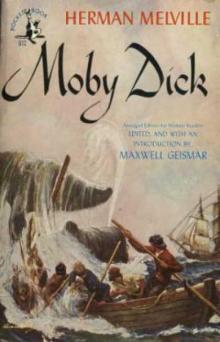 Moby Dick
Moby Dick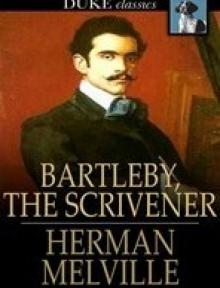 Benito Cereno and Bartleby the Scrivener
Benito Cereno and Bartleby the Scrivener Israel Potter: His Fifty Years of Exile (Annotated Edition)
Israel Potter: His Fifty Years of Exile (Annotated Edition) Billy Budd and the Piazza Tales
Billy Budd and the Piazza Tales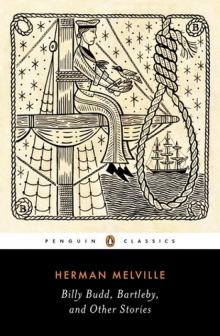 Billy Budd, Bartleby, and Other Stories
Billy Budd, Bartleby, and Other Stories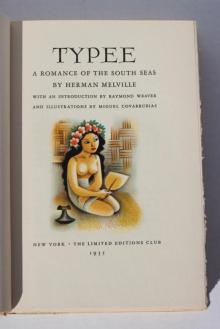 Typee: A Romance of the South Seas
Typee: A Romance of the South Seas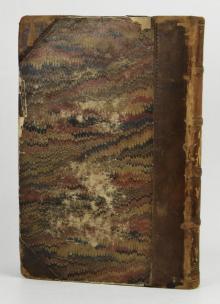 Omoo: Adventures in the South Seas
Omoo: Adventures in the South Seas White Jacket; Or, The World on a Man-of-War
White Jacket; Or, The World on a Man-of-War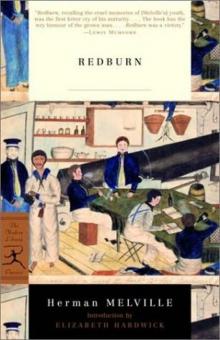 Redburn. His First Voyage
Redburn. His First Voyage Mardi: and A Voyage Thither, Vol. II
Mardi: and A Voyage Thither, Vol. II Typee
Typee The Paradise of Bachelors and the Tartarus of Maids
The Paradise of Bachelors and the Tartarus of Maids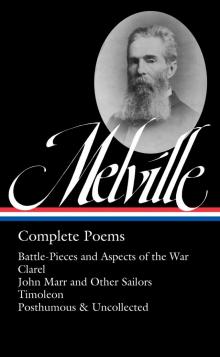 Herman Melville- Complete Poems
Herman Melville- Complete Poems Bartleby and Benito Cereno
Bartleby and Benito Cereno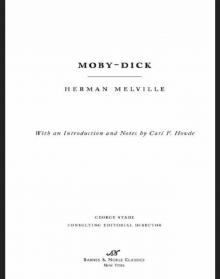 Moby-Dick (Barnes & Noble Classics Series)
Moby-Dick (Barnes & Noble Classics Series) Mardi and a Voyage Thither
Mardi and a Voyage Thither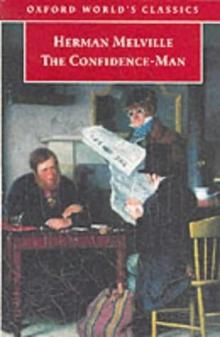 The Confidence-Man
The Confidence-Man Billy Budd and Other Stories
Billy Budd and Other Stories Bartleby the Scrivener
Bartleby the Scrivener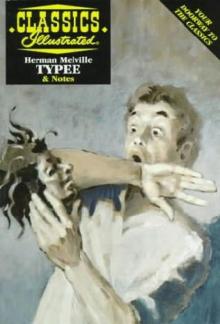 Typee: A Romance of the South Sea
Typee: A Romance of the South Sea I and My Chimney
I and My Chimney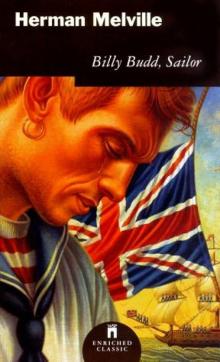 Billy Budd
Billy Budd Pierre, Or the Ambiguities
Pierre, Or the Ambiguities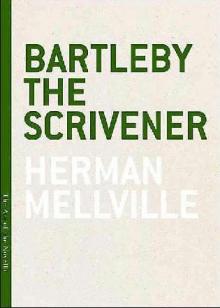 Bartleby, The Scrivener A Story of Wall-Street
Bartleby, The Scrivener A Story of Wall-Street Four Great American Classics
Four Great American Classics White Jacket or, The World on a Man-of-War
White Jacket or, The World on a Man-of-War The Piazza Tales
The Piazza Tales Israel Potter. Fifty Years of Exile
Israel Potter. Fifty Years of Exile